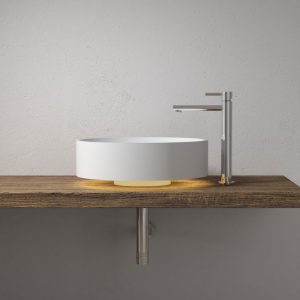A handmade sink is a traditional hand washing device that has some unique advantages and disadvantages compared to modern automatic sensor wash basins. Hand basins offer the advantages of affordability, simple maintenance, ease of operation and durability. However, they also have some distinct disadvantages.
Advantages:
Affordability: Manual sinks are often more affordable than automatic sensor sinks,
especially when it comes to purchase and installation.
This makes hand sinks an ideal choice for people on a budget or for smaller locations.
Simple maintenance: Hand wash basins have no complex electronic or mechanical components,
so they are relatively simple to maintain.
Often only the surface and plumbing need to be cleaned regularly to ensure proper operation.
In addition, because there are no electronic components,
manual sinks have a low failure rate and do not require frequent repair or replacement of parts.
Easy to operate: Hand wash basins are very simple and straightforward to use.
The user simply turns on the faucet, adjusts the water flow and temperature as needed, and then turns off the faucet.
This straightforward operation allows for better control of the strength and temperature of the water flow to suit individual needs.
Durable: Handcrafted sinks are often manufactured from durable materials, such as ceramic, stone or stainless steel.
These materials are durable and corrosion resistant, and can withstand regular use and cleaning for long periods of time.
Disadvantages:
Water waste: A major disadvantage of handcrafted handwashing sinks is that they tend to lead to water waste.
Users may forget to turn off the faucet, resulting in a continuous flow of water,
causing unnecessary water consumption.
Therefore, you need to be aware of the habit of water conservation when using a manual hand wash basin.
Hygiene issues: Hand wash basins require users to control the water flow by touching the faucet.
If users have bacteria, viruses or other dirt on their hands,
these microorganisms may remain on the faucet, increasing the risk of cross-infection.
Therefore, it is important to clean the faucet regularly and maintain good personal hygiene habits.
Lack of automation features: Compared to automatic sensor sinks, manual sinks lack automation features.
They cannot automatically turn the water flow on or off depending on the user’s approach or departure.
This makes it more difficult to conserve water,
relying on the user’s own awareness and behavior to control the timing and amount of water flow.
Lack of water saving features: Manual sinks lack water saving features compared to automatic sensor sinks.
Users need to manually control the timing and intensity of the water flow,
which can easily lead to overuse of water resources.
This is seen as a shortcoming in today’s increasingly conservative water and environmental awareness.
Hygiene hazards: The operation of a manual hand wash basin requires the user to touch the faucet,
and the user’s hands may carry bacteria, viruses or other dirt.
These microorganisms may remain on the surface of the faucet and spread when used by others.
While regular cleaning of the faucet can reduce hygiene risks,
manual sinks are more prone to the risk of cross-contamination than automatic sensor sinks.
Not convenient for special needs: Manual handwashing sinks are often designed with a fixed height and fixed mode of operation,
and may not be suitable for people of higher or lower height.
Manual sinks may be less convenient or easy to use for users with special needs,
such as children, the elderly, or people with physical limitations.
Lack of smart features: Manual sinks do not offer the same smart features as automatic sensor sinks.
Automatic sensor sinks can detect the user’s hand movements
and automatically turn the water flow on or off through sensors, making it more convenient and hygienic.
Manual sinks require manual operation by the user and do not have the convenience of automatic sensing and intelligent control.
In summary, the advantages of manual sinks are affordability, ease of maintenance and durability.
However, drawbacks such as lack of water saving features, hygiene hazards,
inability to adapt to special needs and lack of intelligent features make modern automatic sensor hand wash basins more popular,
especially in public places and environments where hygiene and water conservation are of high concern.













